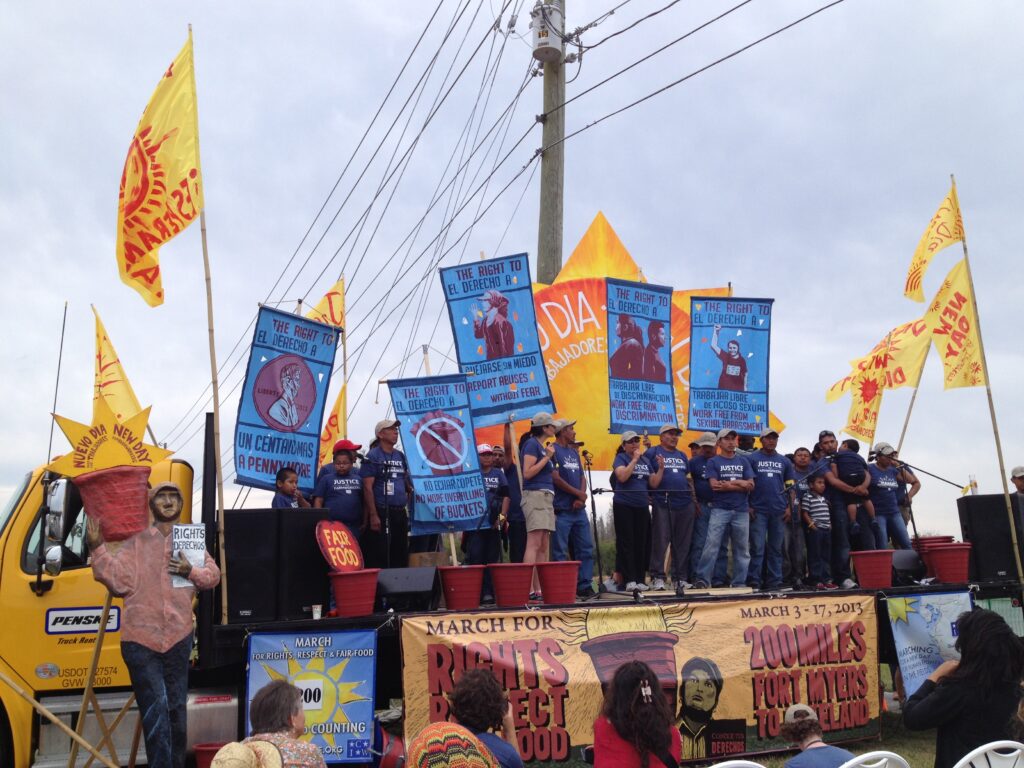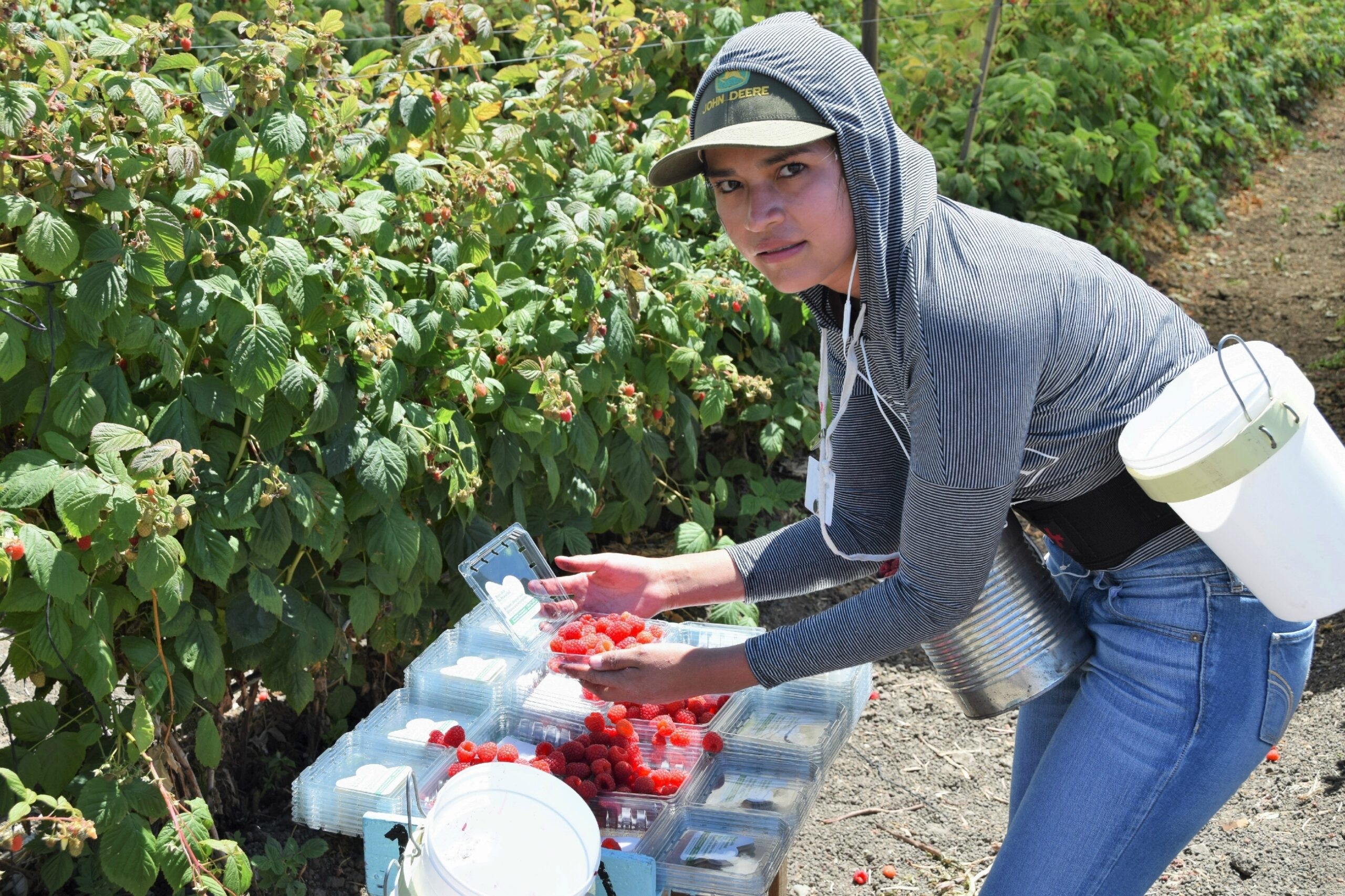Where Have All the Farmworkers Gone?
Arty Mangan | Published: October 6, 2025 Food and FarmingSocial Justice Article
Needless to say, farmworkers are essential workers. They labor long hours with low pay often under harsh conditions to perform the physically demanding and indispensable work that feeds us all. And yet their efforts and sacrifices go, for the most part, unappreciated by society. “These are the forgotten people. The undereducated, the under-protected, the under clothed, the underfed…” That is how legendary journalist Edward R. Murrow described the plight of farmworkers in the 1960 documentary Harvest of Shame. Tragically, the shame endures 85 years later.
Historically, the disenfranchised have been prey for those in power or those who hunger for power treated as “other,” as less-than-human, and as those to be feared. The U.S. farm economy was built on the backs of industrious essential workers, many of whom have no rights, and, at the hands of masked ICE (U.S Immigration and Customs Enforcement) agents, are being ripped away from their families with no notice in mass deportation sweeps. The strategy of fear that victimizes the vulnerable has pushed farmworkers (and others) deeper into the shadows of society, and the repercussions, not surprisingly, have been dramatic. Just one example of a growing trend is a farmer in California’s Central Valley who had to leave $300,000 worth of perfectly good cherries unharvested because 70% of his regular, skilled workforce was too frightened to come to work and earn the wages they desperately need.
Living in Constant Fear
Even some documented workers are afraid to go to work knowing that there have been cases of U.S. citizens who have been arrested, detained and deported by ICE, which uses racial profiling to conduct random raids. The Trump administration has reversed the policy of the previous administration and has given ICE permission to raid schools, hospitals, places of worship and even natural disasters. In an incident in Washington State, ICE conducted a raid taking firefighters away from their work during an active fire–the largest wild fire in the state at the time. After a number of Indigenous firefighters who were detained showed their tribal ID cards and were finally released, two other firefighters were taken into custody by ICE.
“It’s a risk every day to go to work. It’s a risk to go to the grocery store. It’s a risk to drive your kids to school. It’s a risk to drive your child to their doctor’s appointment,” one New York farmworker told Newsweek. Farmworkers have had to resort to a family survival strategy in which the mother and father do not go to work on the same day so they both won’t be arrested by ICE and separated from their families.
One farmworker from Ventura County, California, who wanted to remain anonymous, told the Guardian “We really feel like we’re being hunted; we’re being hunted like animals.”
The raids and living with the fear of a possible raid have affected, not only their ability to earn a living, but also the mental health of many undocumented farm workers.
The Economic Impacts of Scapegoating Essential Workers
The USDA estimates that 40 % of farmworkers are undocumented and that 70-80% of them are foreign born. Millions of these people, many highly-skilled with decades of experience, make their living in agriculture, construction, hospitality, healthcare and other vital components of our economy, and now, through no fault of their own, they are being victimized by a cruel policy that is economically harming all these sectors.
USDA Secretary of Agriculture Brooke Rollins suggests that Medicaid recipients, who will now, under this administration, be compelled to work to receive healthcare, can take the place of the missing migrant farmworkers. Most farmers find such an idea risible. They know that most people born in America tend to shun the hard work, difficult conditions and low pay of farm-work.
Shay Myers is a 3rd generation farmer and CEO of Owyhee Produce, a family operation selling organic and conventionally grown onions, asparagus and watermelons. Recently on a Tik Tok video, Meyer did the math illustrating how essential to the economy undocumented workers are: “Undocumented workers in the U.S. are somewhere between 12 million and 30 million. Let’s pick 20 million. There are 20 million people that are undocumented that are working in the US economy. How many people are not working? What’s our unemployment rate? ……. It’s 4.2 %. It represents about 7.4 million people. Let’s just say we kick those 20 million [undocumented] people out and every single one of those 7.4 million people went to work. There would still be 13 million job openings. Can you imagine what that would do to your community? Can you imagine what that would do to your business? Can you imagine what the impacts would be economically?
Meyer makes the case for the economic value of undocumented workers, but it is important that we also keep in mind the value of those people as vital parts of our society and community. The vast majority are dedicated to making a better life for themselves and their families and to build a foundation for the next generation to thrive.
Grassroots Movements for Justice

The safety net for farmworkers is a David of community organizations working against the Goliath of an unfriendly government. Here are a just three of a number of organizations supporting and advocating for farmworkers.
The Coalition of Immokalee Workers campaigns against abuses in the field, wage theft, and forced labor. After decades of rallying consumers, students and church groups, they negotiated with a number of major food corporations to increase farmworker wages and to agree to enforceable standards to safeguard farmworkers’ rights.
California is home to an estimated 165,000 Indigenous Mexican farmworkers. Over 80 percent of Indigenous farmworkers in California come from the Mexican state of Oaxaca. Facing discrimination as indigenous people in their home country, coming to the U.S., they encounter new challenges: violations of labor laws and rights, workplace retaliation, wage theft, etc.
Mixteco/Indigena Community Organizing Project (MICOP) assists Indigenous agricultural workers on California’s Central Coast. MICOP helps these people, who only speak their native indigenous language, overcome the language barrier; educates people on how to heal the trauma of internalized racism after so many years of dealing with oppression; and provides safe space for victims of domestic violence. They help build healthy communities and fight for the rights of farmworkers in the workplace.
Anne Lopez is the author of The Farmworkers’ Journey that tells the story of how the North American Free Trade Agreement (NAFTA) impoverished Mexican farmers, forcing millions to cross the border to work on American farms. Moved by the struggles of the migrant workers that she interviewed for her book, Dr. Lopez founded the Center for Farmworkers Rights, which, along with fighting for the rights of farmworkers, leads farmworker reality tours; provides scholarships for young people in these families; and distributes food, household items, clothing, and other essential products and services to address the immediate needs of farmworkers facing food insecurity and clothing shortages.
These kinds of good Samaritan efforts help mitigate the injustice and trauma of being a member of an oppressed and disenfranchised social class, but what more can be done?
A Plan for Structural Change
Dr. Lopez didn’t pull any punches at the Center for Farmworker Families Harvesting Equity Conference when she said that “farmworkers make up a slave subclass modeled after slavery in the [Antebellum] South.” As a remedy, she offered three steps to transform the lives of farmworkers: (1) comprehensive immigration reform, (2) a living wage, and (3) a contract with their employers.
Her call for justice questioned why people who work in the fields have to live in constant fear of being deported and why a systemic impoverishment of such a critical part of agriculture has forced them to depend on charity to get their basic needs met. Lopez also cited a UC Merced study that found that 22.5% of farmworkers’ earnings are stolen by their employers as a key reason why contracts are needed so that farmworkers have a legal option to recoup their wages.
Mahatma Gandhi, spiritual and political leader whose non-violent campaign led to India’s independence after 200 years of British rule said, “The true measure of a society is how it treats its most vulnerable members.” Farmworkers are too important to be relegated to the shadows of society as victims of injustice and racism. What will it take to realize that our personal health, as well as the agricultural economy, are directly dependent on the health and wellbeing of those essential workers who live and labor on the fringes and to finally give them the equity, respect and justice they deserve?

For more articles like this sign up for the Food Web newsletter
